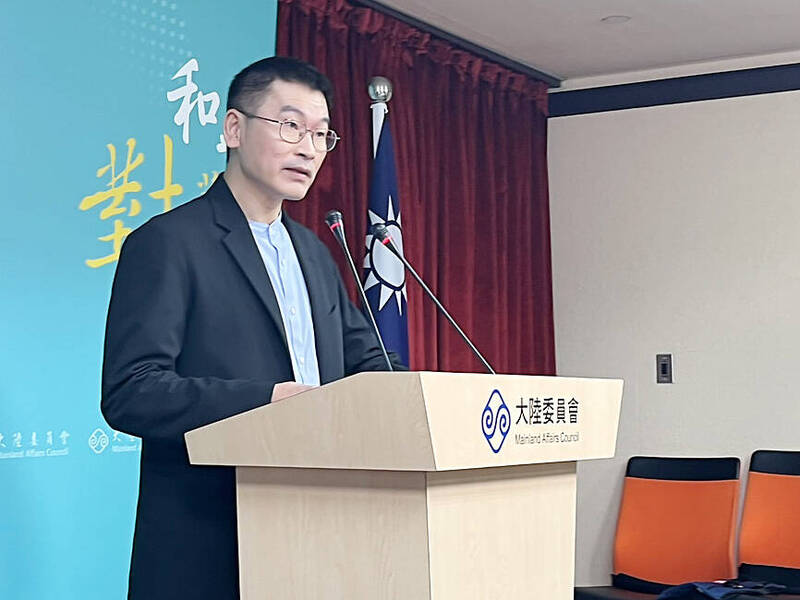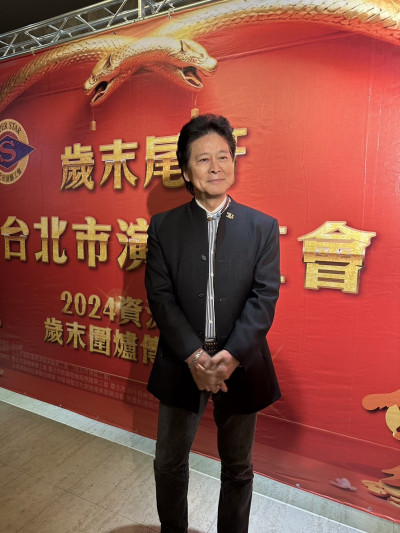《TAIPEI TIMES》 MAC to strictly scrutinize Chinese religious visitors

Mainland Affairs Council Deputy Minister and spokesperson Liang Wen-chieh speaks to reporters in Taipei yesterday. Photo: Chen Yu-fu, Taipei Times
By Shelley Shan / Staff reporter
The government yesterday said it is to strictly scrutinize Chinese who apply to visit Taiwan for religious reasons, after three Taiwanese members of Yiguandao were arrested in China for allegedly using the organization to disrupt the rule of law.
China’s Taiwan Affairs Office on Wednesday criticized the Democratic Progressive Party (DPP) government for using the case involving the three members to “manipulate politics” and “impede cross-strait exchanges without legitimate reason.”
It also asked why the DPP government has yet to lift the ban on group tours to China, why it has yet to respond to a request to resume charter ferry services connecting Taiwan and Pingtan in China, and why it maintains an “orange” alert for travel in China.
It said that the purpose of “united front” work is to make friends and facilitate exchange.
“Yiguandao is named after a term in Confucius’ (孔子) Analects (論語). It is probably the only religion in Taiwan that actually has members reading Confucius’ teachings, which is part of Chinese culture. If members of this religion were arrested in China for being involved in a cult, what qualification does it have to accuse the Taiwanese government of destroying Chinese culture?” Mainland Affairs Council Deputy Minister Liang Wen-chieh (梁文傑) told reporters.
China defines a cult as an organization that falsely uses religion and qigong (氣功) — a system of coordinated posture and movement, breathing and meditation — to build mythical tales, produce and spread superstitions and unorthodox teachings to deceive and control members in ways that threaten society, Liang said, adding that no part of the definition applies to Yiguandao.
Religious freedom does not exist in the People’s Republic of China, and so-called “cross-strait religious exchanges” are only a “united front” tactic, Liang said.
“The greatest obstacle to cross-strait religious exchanges is that members of an appropriate religion in Taiwan could be arrested in China,” he said, adding that Beijing should quickly release the three Yiguandao members, all of whom are elderly.
See EDITORIAL on page 8
The council does not agree with the office’s description that the purpose of “united front” work is to make friends, he said.
“It [united front work] was one of three major tactics that former Chinese Communist Party (CCP) chairman Mao Zedong (毛澤東) used to defeat the Chinese Nationalist Party (KMT), which subsequently retreated to Taiwan. It consisted of attacking the arch enemy by partnering with minor enemies, isolating your opponent and treating your friends well. It might sound like a graceful term for the CCP, but not for Taiwan,” he said.
Responding to the Taiwan Affairs Office’s questions, Liang said that the Mainland Affairs Council also has three questions: Why Beijing has yet to completely reopen tourism to Taiwan despite the removal of all COVID-19 pandemic restriction; why Chinese military aircraft and ships continue to harass Taiwan amid all the talk about cross-strait exchange; and why Beijing interrogates and detains Taiwanese upon arrival in China.
“We are checking if the Chinese Ministry of Culture and Tourism would make further announcements about Chinese tourists visiting Taiwan,” Liang said.
Chinese living outside China can currently visit Taiwan.
As of last month, about 134,000 applied for permits to visit Taiwan, of whom 95,000 arrived, MAC data showed.
新聞來源:TAIPEI TIMES













